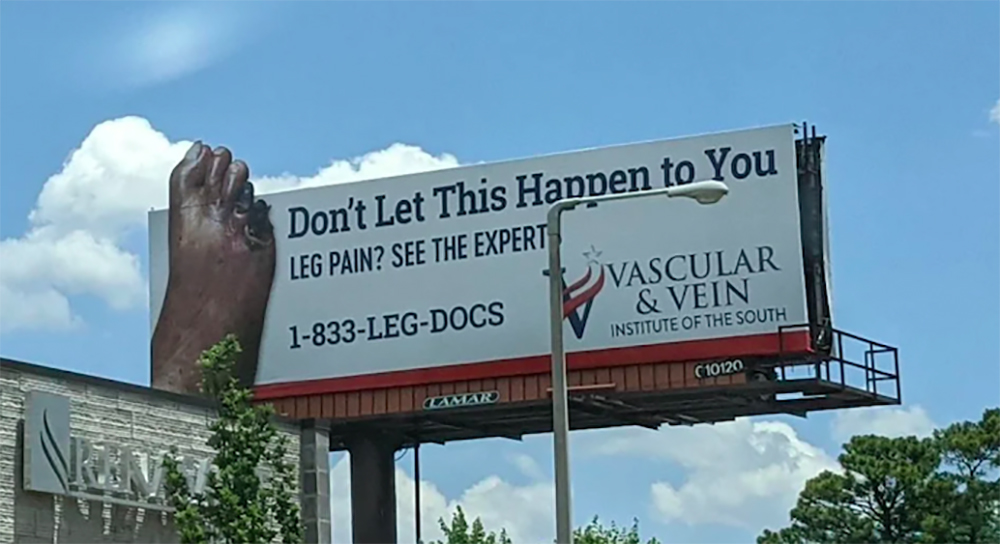The foot looks diseased, glossy in brown-black, and rot has taken the smallest toe, replacing it with a black mass of corrupted flesh.
This is not a line from a zombie horror novel. It’s a description of a foot on a billboard that rises over Union Avenue, one that has greeted commuters, tourists, and more for ages. It’s hard to miss, hundreds of feet in the air, and it looks to be the size of a Honda Civic.
The billboard and others like them have grossed out many Memphians. Some have wondered what would have to be done for them to come down. But billboard content — even those diseased feet — is protected by the First Amendment. Tennessee had to shift its existing billboard law just last year to comply with a free-expression ruling from a federal court that was years in the making and started in Memphis.
The feet and the public
By some accounts the Union Avenue foot isn’t the worst one. A different foot on other billboards around Memphis barely seems human. It’s smaller and its dried, bark-colored skin seems mummified, leaving some to mistake it for a tree branch. Several toes are missing amid masses of yellow scabs.
“Don’t let this happen to you,” read the billboards from the Vascular and Vein Institutes of the South.
As long as these billboards have been up, Memphians have complained about them online.
“2020 is awful enough,” Hannah Zaleski wrote in a Facebook post in October. “Can someone PLEASE take down the vascular rotten feet billboards around Memphis?”
Replies to the post said the billboards are “so gross!” and “I legit hateeeee them,” and “I get so vomity in the back of my throat EVERY. TIME.”
Earlier this year, Reddit user Burythepezz posted this:
Reactions there were: “I have to see this every morning on the way to work. WHY?” and “I’m still 90 percent sure that’s a mummy foot,” and “I just moved here. I actually gagged when I saw it.” Medical professionals weighed in, too, explaining that “diabetes is a killer” and “I get patients with elephant feet ALL THE DAMN TIME.”
”They aren’t old people usually, they have their own kind of funky feet,” wrote Reddit user superpony123, who identified as a registered nurse. “But this shit right here is so, so common with very obese people who get hard, scaly skin on their shins and feet. It’s common with people who have bad peripheral vascular disease, which is caused by high blood pressure and/or diabetes but usually people have both down here.”
No official explanation of the disease or the strategy behind posting the feet on billboards was given. No one from the Vascular and Vein Institute of the South responded to a call for comment on this story. The clinic has six Mid-South locations scattered from Millington to Oxford, Mississippi. No one from Lamar Advertising, the billboard’s owner, responded either.
Some online wondered how the billboards could be changed and who controls the content of billboards in Memphis. According to Dan Springer, Deputy Chief Operating Officer for the city of Memphis, no one in the city controls it.
“Our sign code does not regulate content, per United States Supreme Court precedent,” Springer said in a statement. “Signage is protected free speech under the First Amendment of the Constitution.
Our sign code does not regulate content, per United States Supreme Court precedent.
Dan Springer, Deputy Chief Operating Officer for the city of Memphis
“Content-related sign regulations are subject to ‘strict scrutiny,’ meaning they must be narrowly tailored to serve a compelling governmental [or public] interest. This is a very high bar; the United States Supreme Court almost always strikes down content-related regulations for failing to sustain a strict scrutiny analysis.”

The state does not control billboard content either, said Shawn Bible, manager of the Tennessee Department of Transportation’s (TDOT’s) Beautification Office. Her office controls the number of billboards on some state routes and on interstates, their spacing, and their size. Much of that, she said, comes down to beautification efforts and promoting un-distracted driving.
Bible’s office handles billboard complaints, especially after a new law passed in 2020. But she said, “I’ve been here 17 years and I have not had any complaints about billboard content. We haven’t had any naked ladies, or, you know …”
I’ve been here 17 years and I have not had any complaints about billboard content.
Shawn Bible, TDOT’s Beautification Office
One caller, though, complained about a sign that suggested “certain government officials were corrupt.” Another time, her office got a call from a minister who was traveling with his grandson and saw a billboard with graffiti that made the sign “say a bad word,” Bible said. They contacted the company and corrected it.
But as far as a Memphian calling up about a billboard with a rotting foot, that’s not really what Bible’s office does, yet. Even if they did, it would be doubtful that any state agent could control billboard content. Tennessee — especially Memphis — was at the center of a lawsuit focused on this issue watched by industry professionals, First Amendment advocates, government officials, and politicians alike.
Memphis at the center of Tennessee billboard fight
William Harold Thomas Jr., a billboard owner, began fighting Tennessee’s billboard laws in federal court in 2013. The suit revolved around whether or not he needed a permit to erect a billboard on a vacant lot he owned.
Arguments swirled around Tennessee’s law regulating billboards. It had different rules for billboards located on the place the activity or property advertised. It had different rules for billboards with commercial messages, like advertising, and noncommercial messages, like a Bible verse. All of those arguments, though, boiled down to one thing: Did the rules restrict free speech?
State attorneys argued in a federal appeals court that the law sought to serve public interests for traffic safety and for protecting the constitutional rights of the property owner, according to information from Middle Tennessee State University’s Free Speech Center.
Germane to the Memphis foot billboards, though, the state attorneys also argued that the law served public interests in protecting public aesthetics. However, the 6th U.S. Circuit Court of Appeals said, “public aesthetics was not a compelling governmental interest,” according to the Free Speech Center. Neither were the other augments, the court said.
In 2017, the court ruled Tennessee’s billboard law was unconstitutional. Writing for the three-judge panel, Judge Alice Batchelder said in enforcing sign laws, “there is no way to make these decisions without understanding the content of the message.”
The 2020 Fix
Last year, Tennessee Governor Bill Lee signed legislation passed by the Tennessee General Assembly to fix state law around the court ruling. It came with a host of new definitions for billboards and was applauded by industry leaders for offering new certainty and stability in the Tennessee billboard business.
The new law adds a billboard complaint process. But Bible said TDOT’s Beautification Office doesn’t yet know what that will look like.
“We’re working on new rules and regulations … to figure out how to have that complaint process,” Bible said. “So, we haven’t not worked out the complaint process.
“I have to say, we have not gotten any complaints. If we had, I’d remember and I’d tell you anyway. But we haven’t been keeping a formalized list because we haven’t worked out how to do it.”
Bible said she’s waiting for word on details about the complaint process from the legislature and the billboard industry.
